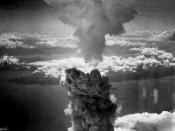In August of 1945 nuclear weapons were released upon the people of Hiroshima and Nagasaki in Japan. Soon after Japan surrended, consequently ending WWII. But was dropping the bomb justified, or an immoral act?
After the attack of Pearl Harbour in December of 1941 American military started work on the Manhattan project in secret. During the time of the development of the bomb president Roosevelt died, President Truman succeeded him and continued work on the atomic bomb.
Even after facing massive conventional bombings and the capturing of surrounding islands the Japanese still refused to surrender. America issued Japan with the Potsdam proclamation, which demanded the unconditional surrender of Japan. This was rejected, as the Japanese were not prepared to give up their Emperor, as they believed him to be a god. Perhaps this led to the belief that the Japanese would not surrender unless dramatic action was taken. An invasion was most likely out of the question because the cost of lives, both American and Japanese, would be too high.
At the beginning of WWII the bombing of civilians was considered a barbaric act. However as the war progressed both sides abandoned previous restraints, although international law had always distinguished between civilians and combatants.
Prisoners of war captured by the Japanese were starved, tortured and killed. The Japanese felt that to surrender was to show weakness and that is why they chose to fight to the death. Perhaps it is for these reasons American militants felt that if the war continued the way it was up to a million lives would be lost (both American and Japanese.) With this in mind dropping the atomic bomb may have saved many lives.
As the war in Europe was drawing to an end, the allies focused their efforts on defeating Japan. The...



Good.
Not too bad for a high school essay.
It could have been improved by gathering up your main points and structuring your paragraphs around them. (ie. One paragraph on dropping an atomic bomb saved lives and one on that the dropping of the atomic bomb served as a disincentive to drop an atomic bomb ever again.)
Alot of the essay was wasted on narration. Sticking to two clear paragraphs might help you to stick to analysis not narrative.
The first point is a bit of a classic. At the same time it is easy to question it's legitimacy. By doing this you can make your analysis more complete. I personally think that the dropping of these two bombs saved American lives at the expense of Japanese lives.
4 out of 4 people found this comment useful.